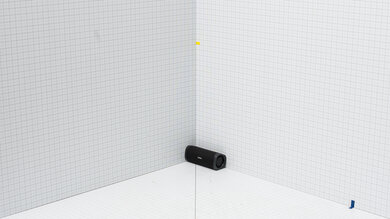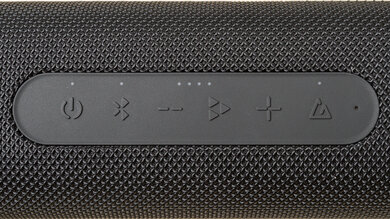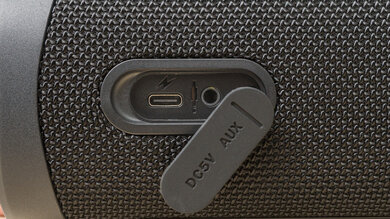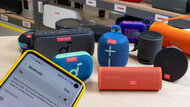The EarFun UBOOM L is a portable Bluetooth speaker designed for listening to music wherever you go. Its small and lightweight design makes it easy to carry around in your bag or backpack. It's even rated IP67 for dust and water resistance to help protect it against the elements. It doesn't come with as many sound enhancement features as more premium models; you can still switch between its Indoor and Outdoor sound modes as you move around, and its Video Mode helps reduce latency when you watch videos through your paired device.
Our Verdict
The EarFun UBOOM L is passable for music. Voices and lead instruments are present in the mix, though they lack some detail due to the roll-off in the treble range. Also, this smaller speaker doesn't bring a lot of punch or rumble in the bass, which is disappointing if you love bass-heavy genres like EDM and hip-hop. You can widen the speaker's sound with its Outdoor Mode, but it doesn't have more traditional bass or treble adjustments to customize its sound.
-
Portable design.
-
Clear reproduction of vocals.
-
Few sound customization tools.
-
Lacks low-bass.
The EarFun UBOOM L is middling for videos. You can pair up your smartphone to watch videos, and the speaker's Video Mode helps reduce latency to avoid lip-synching issues. It's not designed for movies, though, since it doesn't get very loud and doesn't reproduce a lot of low-bass.
-
Video Mode to reduce latency.
-
Not loud enough for larger spaces.
-
Lacks low-bass.
The EarFun UBOOM L is okay for podcasts. Thanks to its balanced mids, voices are reproduced with clarity in the mix. They lack detail, though, due to the roll-off in the treble. Unfortunately, you don't have many sound customization tools to switch up its performance. It's loud enough for an average-sized room, though it struggles to fill up larger spaces with sound, so you might want to stereo pair a second unit if you prefer a louder sound.
-
Portable design.
-
Clear reproduction of vocals.
-
Few sound customization tools.
-
Not loud enough for larger spaces.
The EarFun UBOOM L doesn't have built-in voice assistant support. Instead, it uses the voice assistants from your paired smartphone. Overall, the speaker does a decent job picking up your commands when you're far away or in a noisier environment. It doesn't have as many features as speakers designed with voice assistant use in mind, though, so you can't mute its microphone, for example.
-
Clear reproduction of vocals.
-
Not loud enough for larger spaces.
-
No built-in voice assistants.
The EarFun UBOOM L is acceptable for outdoor use. This small, lightweight speaker is incredibly portable, and its IP67 rating for dust and water resistance helps protect it against the elements. Its Outdoor Mode is also designed for listening in larger and more open spaces. This speaker doesn't get as loud as other models on the market, like the JBL Charge 5, and its battery life falls short of its advertised length.
-
IP67 rating for dust and water resistance.
-
Portable design.
-
Few sound customization tools.
-
Not loud enough for larger spaces.
- 6.0 Music
- 5.6 Videos/Movies
- 6.7 Podcasts
- 4.8 Voice Assistant
- 6.2 Outdoors
Changelog
- Updated Jan 29, 2024: Added information to the Battery box about the speaker's performance on Outdoor vs Indoor Mode.
- Updated Jan 15, 2024: Review published.
- Updated Jan 05, 2024: Early access published.
- Updated Dec 20, 2023: Our testers have started testing this product.
- Updated Dec 12, 2023: The product has arrived in our lab, and our testers will start evaluating it soon.
Check Price
Differences Between Sizes And Variants
The EarFun UBOOM L is available in Black, and you can see the label for our tested model here.
If you come across another version of this speaker, let us know in the forums so we can update this review.
Compared To Other Speakers
The EarFun UBOOM L is a portable Bluetooth speaker with a design similar to other models like the JBL Charge 5. It's a more wallet-friendly option for listening on the go, though its sound quality isn't as impressive as that of more premium models like the JBL. You don't get access to as many sound customization tools as similarly-priced models like the Anker Soundcore Flare 2.
See also our recommendations for the best Bluetooth speakers under $100, the best portable Bluetooth speakers, and the best waterproof Bluetooth speakers.
Depending on your listening habits, you may prefer either the JBL Flip 6 or the EarFun UBOOM L. They're both portable Bluetooth speakers with similar designs but have different strengths. The JBL is better built, and its default sound is more even, which some users may prefer. It's more customizable, too, thanks to its graphic EQ. However, it doesn't support voice assistants like the EarFun.
The JBL Charge 5 and the EarFun UBOOM L are similarly designed portable Bluetooth speakers. However, the JBL is the better pick overall. It's better built with a longer battery life and offers better sound quality with more rumble in the bass range. Also, its companion app gives you more control over its sound thanks to its graphic EQ. It has to downmix stereo sound into mono, unlike the EarFun.
The Anker Soundcore 3 and the EarFun UBOOM L are both portable Bluetooth speakers available for less. The Anker is the better of the two, as it has many more customization features, like a graphic EQ. Also, it has a longer-lasting battery life and a smaller size that may be more ideal for some users.
The EarFun UBOOM L and the Anker Soundcore Boom 2 are both budget portable speakers. While the UBOOM has a lower retail price, the Anker offers a better price-to-performance ratio. They both have front-facing designs that limit their directivity, and they get equally loud, with similar degrees of compression at max volume. They're also similarly portable and well-built, though the Anker has a carrying handle to help you bring it around in one hand. The Anker has a more balanced sound profile and a much longer battery life, though, plus you can connect up to two devices simultaneously.
The Tribit StormBox Blast is a more premium alternative to the EarFun UBOOM L. The Tribit comes with a lot of extra features, such as RGB lights and a graphic EQ to customize its sound. It also gets louder than the EarFun, and its battery life is longer-lasting. That said, it doesn't support voice assistants like the EarFun.
Test Results
The EarFun UBOOM L is an all-black horizontal speaker designed for on-the-go listening. It looks similar to other speakers like the JBL Charge 5.
The EarFun UBOOM L has a great build quality. It doesn't feel as premium as other portable Bluetooth speakers like the JBL Charge 5, but its materials still feel good and solid. The mesh feels sturdy, and the texturized rubber buttons on top are good to touch. However, the plastic build for the passive radiators on the sides feels a little cheap, and the rubber isn't as good quality as what you get with the JBL.
This speaker has an easy-to-use selection of physical controls. Since it doesn't have a companion app, you can control all its settings from the device itself. The buttons are clicky and offer good feedback, so it's easy to keep track of the settings as you adjust them. There's even audible feedback when you turn the speaker on/off as well as when you reach maximum volume.
- Power button:Press to turn the speaker on/off.
- Bluetooth button:Press once to pair to a device over Bluetooth. Press twice to activate Video Mode, which reduces latency. Hold for three seconds to start True Wireless Stereo pairing.
- Volume buttons:Press to raise/lower the volume.
- Play button:Press to play/pause audio or answer/end phone calls. Hold to activate the voice assistant from a connected device.
- Sound Mode button: Press to switch between the Indoor and Outdoor sound modes. Hold for two seconds to enable Party Mode with a paired speaker, which lets you play both devices simultaneously.
The EarFun UBOOM L has a passable frequency response accuracy. Its sound profile is fairly even, especially in the mids, where most voices and lead instruments are reproduced. However, the roll-off in the treble range makes audio sound less detailed. Like most small speakers, it also lacks a lot of low-bass, so you don't get the deep thump and rumble in genres like EDM and hip-hop.
This speaker comes with Indoor and Outdoor sound modes, which are designed to adjust audio to suit the space you're in. Outdoor mode is designed for listening in larger, more open spaces like a backyard. We tested the speaker in Indoor mode since it offered the most even sound profile. You can see a comparison of the two sound modes here, and you'll notice that Outdoor mode brings a touch less punch in the bass. We also tested the speaker with Video Mode turned on and off, and we found that it had no impact on the sound.
This speaker can playback stereo sound, which is great since most music is mixed in this format. It has a more front-facing design, so you don't get consistent sound from all angles around the device.
The EarFun UBOOM L gets loud enough to fill an average-sized living room with sound. However, it doesn't get as loud as other models we've tested, and there's some compression when you push it to max volume. You can always stereo pair a second unit to the speaker if you want a louder sound.
Though it's advertised to have a 16-hour battery life, in our tests, the speaker only lasted a little over six hours when set to Indoor Mode. It lasts longer when set to Outdoor Mode, though, with a battery life of around 9 hours. Some users have reported the opposite—that Outdoor Mode drains the battery faster—but we couldn't replicate this in our tests. Let us know in the forums if you experience anything similar.
This speaker doesn't have any built-in voice assistant support. Instead, it uses the voice assistants from your paired smartphone. It does a decent job of picking up your commands with Google Assistant. The speaker didn't perform as well in our tests with Siri, but subjectively, we didn't notice much of an issue with its performance.
You can wire your devices to the speaker using the AUX port. There's also a USB-C port to charge the speaker, and you can use it to charge other devices like a smartphone, which is handy.
This speaker is Bluetooth compatible, though you can only pair it to one device at a time. If you want to watch videos on a paired smartphone, you're in luck since this speaker comes with a Video Mode designed to reduce latency. It significantly improves the speaker's performance, so you notice fewer lip-synching issues with your videos and movies. Our results represent the speaker's performance with Video Mode on; you can expect much higher latency if you turn it off.
Comments
EarFun UBOOM L: Main Discussion
Let us know why you want us to review the product here, or encourage others to vote for this product.
- 21010
As noted, firmware 0.4.3 has a very good sound thanks to Oleg’s cooperation with FAEs. Version 0.5 has (subjectively) terrible sound, more bass, maybe volume a bit, but it is not that neutral sound. I haven’t tried 0.4.8 which is last Oleg’s version, but it is also considerable (more info) .
Uboom L deserves testing and measurements on 0.4.3.
Edited 1 year ago: asking dear staff for re-testing - 21010
Столько шума из-за маленькой колонки с расширением баса 75 гц . Купите Flex и получайте удовольствие!
Update: Added information to the Battery box about the speaker’s performance on Outdoor vs Indoor Mode.
- 65450
When researching the Uboom L, most say 0.4.3 is the best version. I think many want some kind of official comparison between 0.4.3 and the latest, at the very least. If it’s possible, please compare the firmware versions. Thanks in advance.
- 21010
Hello cratos1592, Thank you for your input. I am the one who is currently testing the UBOOM-L, so I’m able to answer your questions/concerns. Keep in mind the review will not be up on the site until some time in January, as we will be closed during the holidays.
- I listened subjectively to the speaker for about 10 minutes on {Video mode}, but noticed no crackling. The speaker we purchased was on the latest firmware version (0.5.0), so we cannot say if this was an issue on previous firmware. It’s possible this may be an issue with your particular unit. I would contact the manufacturer to get more information.
- Speaker connection with a TV box is not something we test for currently. However, If many users would like to see this speaker tested this way, it is something we could consider adding to the review.
- We compared an aux connection to a bluetooth connection (Both on indoor mode), to see if sound quality/profile would change. Subjectively, both sounded the same. The frequency response is also the exact same, so you can expect the same sound whether you connect over an aux or bluetooth. https://i.rtings.com/assets/pages/aOXcLo3u/aux-comparison-medium.jpg
- We compared both indoor and outdoor modes to determine which would provide the best sound. We chose indoor mode, because we expect more users to use it (default mode) and it provided a sound profile closer to our desired curve. We also tested for {video mode}, and this feature has no impact on the sound (affects latency and bluetooth range only). https://i.rtings.com/assets/pages/aOXcLo3u/sound-modes-medium.jpg Hopefully this answers your questions!
ufff what bad luck about the video mode with me. :‘c impressive how far ahead you were with all our proposals. a real professional… thank you very much for responding.
- 32120
1) There is a crackling sound in video mode. like static. which is fixed in version 5.0, sadly I updated and it was not fixed. Product quality standards are very uneven. but it’s worth remembering. 2) It has a hands-free system for calls. And I don’t know if it works as a microphone for Google if you connect it to a TV box. But I think it’s worth trying. 3) It has an AUX input so connecting it with a cable to do sound tests would greatly increase the quality over Bluetooth. It would be good to try it with or without cable. 4) apart from the movie mode, it has an indoor (music mode) that is the default and an outdoor mode. We would appreciate many if you try all 3 modes. and tells us which one has the best quality for the 3 profiles that you analyze. since Rting just has those 3 specific profiles. (movies, music, ourdoor) I mean, don’t get carried away by the name of the companies but tell us, independently of those names, which one is best for each section. thanks for listening to us greetings.
Hello cratos1592, Thank you for your input. I am the one who is currently testing the UBOOM-L, so I’m able to answer your questions/concerns. Keep in mind the review will not be up on the site until some time in January, as we will be closed during the holidays.
I listened subjectively to the speaker for about 10 minutes on {Video mode}, but noticed no crackling. The speaker we purchased was on the latest firmware version (0.5.0), so we cannot say if this was an issue on previous firmware. It’s possible this may be an issue with your particular unit. I would contact the manufacturer to get more information.
Speaker connection with a TV box is not something we test for currently. However, If many users would like to see this speaker tested this way, it is something we could consider adding to the review.
We compared an aux connection to a bluetooth connection (Both on indoor mode), to see if sound quality/profile would change. Subjectively, both sounded the same. The frequency response is also the exact same, so you can expect the same sound whether you connect over an aux or bluetooth. https://i.rtings.com/assets/pages/aOXcLo3u/aux-comparison-medium.jpg
We compared both indoor and outdoor modes to determine which would provide the best sound. We chose indoor mode, because we expect more users to use it (default mode) and it provided a sound profile closer to our desired curve. We also tested for {video mode}, and this feature has no impact on the sound (affects latency and bluetooth range only). https://i.rtings.com/assets/pages/aOXcLo3u/sound-modes-medium.jpg
Hopefully this answers your questions!

































